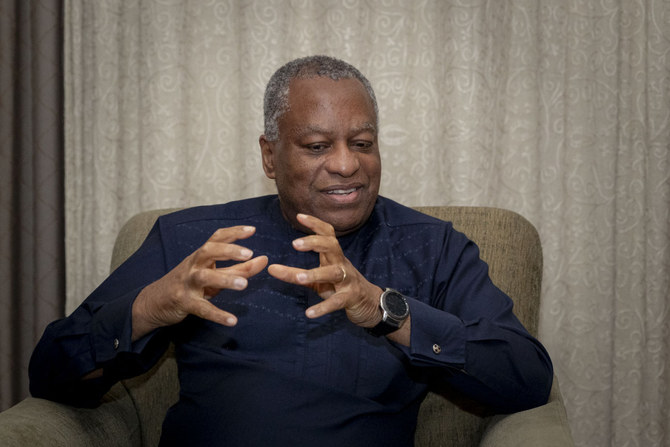RIYADH: Nigeria’s foreign minister has said that he hopes trade with Saudi Arabia blossoms after the creation of new business and diplomacy initiatives during a visit to Riyadh.
Geoffrey Onyeama and Saudi Foreign Minister Prince Faisal bin Farhan agreed to the creation of a joint-business council and a diplomatic corps exchange program to boost cooperation and deepen relations.
“We both agreed that we already have good relations between the two countries, in particular good political relations. We have shared values,” Onyeama told Arab News.
“But we felt like we can make a big improvement in the level of trade in particular. We have similar economic profiles as we are both oil-producing and exporting countries so the energy sector is one that we are both very strong in,” he said.
Prince Faisal and Onyeama reviewed bilateral cooperations and discussed opportunities that will further enhance security, trade, energy and economy.
“We highlighted the importance of enabling investments in each other’s countries, and the importance of making that real through concrete measures,” Onyeama said of the new council.
He said the initiative would have 10 people on each side — “prominent entrepreneurs, public and private sector, and also some of the institutional stakeholders like the Ministry of Trade and the Ministry of Foreign Affairs and so forth.
“We want it to be an institutional mechanism for concrete trade promotion,” he added, saying he hoped to see a spark in economic cooperation.
The second initiative will enable junior diplomats from both countries to meet regularly to create a better understanding and strengthen relations.
“What we are doing is laying that solid bond between them so as they grow up in the system, their careers as foreign service officers they will have this familiarity with each other and know how each side ticks and make it much easier to forge what we want to be a special relationship between the two countries,” he said.
Junior diplomats will exchange visits every other year for two to three weeks and look at global issues facing their regions.
“We think that these two institutional mechanisms that we are putting in place will see the relationship even closer five to seven years down the line,” said Onyeama.
Relations between the two countries are already strong. Nigeria was one of the first countries to extend its support in the Kingdom’s bid to host the 2030 World Expo.
Onyeama said that he and Prince Faisal reviewed areas where they can promote corporations including energy, inclusivity, and security and stability.
“Saudi Arabia … has made great strides in the areas of renewables so that was something we focused on,” he said.
“We are also two countries seeking to diversify our economies and much more in areas such as agriculture, in particular, renewable energy.”
He added that the two ministers also discussed hoped-for reforms of multinational bodies such as the UN, “to make them more inclusive and more representative of the world of today” so that they can tackle issues “that are of importance to developing countries such as ourselves and Saudi Arabia.”
The ministers also looked at various key global issues in their regions including Libya, Yemen, Syria, Lebanon, and Palestine, and the terrorism crises in West Africa.
“There are challenges, we recognized security and terrorism and its urgencies, especially in the West African regions and also the terrorist challenges you also face in your regions and how we can cooperate in these areas,” he said.
Onyeama also recognized the financial support Nigeria has received from Saudi Arabia and the efforts to organize a donor conference to assist in the humanitarian crises that have been caused by the terrorist group Boko Haram.
The two ministers then went on to discuss the management of climate action. “It’s interesting to learn of the progress that is being made by Saudi Arabia in the clean energy realm, solar energy and wind energy in particular and we felt that these are areas in which Nigeria can learn from and benefit from investments from Saudi Arabia.”
Onyeama said that there were many strong bonds between Saudi Arabia and Nigeria.
“The people-to-people contact is there, the religious contact is there and then the solidarity that has been built up as oil-producing exporting countries has also been there,” he added.
“The largest number of Nigerians outside of Nigeria will be found in Saudi Arabia, Nigerians have been coming to Saudi Arabia for generations now, three, four, five generations.”
During the visit to the Kingdom, Onyeama also toured the birthplace of the first Saudi State, Diriyah, where he discussed the cultural heritage of the Kingdom.



























